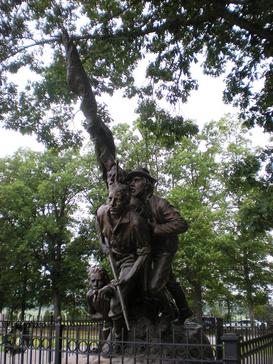North Carolina State Monument (Gettysburg, Pennsylvania) facts for kids
 |
|
| Location | Seminary Ridge, Gettysburg National Military Park |
|---|---|
| Beginning date | 1928 |
| Completion date | July 3, 1929 |
The North Carolina Monument is a special statue that remembers the soldiers from North Carolina who fought in the American Civil War. It specifically honors the 32 North Carolina regiments that were part of the big Battle of Gettysburg. This important artwork was created by an American sculptor named Gutzon Borglum. You can find it on Seminary Ridge in the Gettysburg National Military Park.
What the Monument Looks Like
The monument is surrounded by beautiful Dogwood trees. These trees are North Carolina's state flower. The statue shows soldiers from North Carolina moving forward during a famous battle charge. This charge was called Pickett's Charge. Fifteen North Carolina regiments fought here and many soldiers were hurt or lost their lives.
You can see four figures in the sculpture. One soldier is kneeling down, injured. He points towards the enemy. Two other soldiers hold their guns and look ahead, ready to fight. A fourth soldier holds a flag with both hands. He also looks forward. The sculptor, Gutzon Borglum, signed his name on the artwork. The back of the monument simply says "NORTH CAROLINA".
How the Monument Was Made
The idea for this monument started in 1913. Veterans from the American Civil War in North Carolina suggested it. They visited the Gettysburg Battlefield and wanted a way to remember their soldiers. After World War I, groups like the North Carolina United Daughters of the Confederacy continued the plan. Governor Angus Wilton McLean also helped in 1927.
North Carolina provided $50,000 to buy the land and build the monument. They hired Gutzon Borglum to design it. Borglum was also working on the famous Mount Rushmore monument at the time. He designed the North Carolina monument in Texas. The person who designed the Confederate flag was the model for the flag bearer in the statue. Other soldiers were sculpted from photographs of real Confederate soldiers.
The monument was dedicated on July 3, 1929. Bands from the US Navy and the 6th Field Artillery played music at the ceremony. Over the years, the monument has been cared for. In 1954, a wooden marker at the site was damaged. President Kennedy visited the monument in 1963. This was before a special rededication for its 100th anniversary.
In 1985, the monument needed a big repair. It was lifted by a helicopter to be sent away for restoration. A fence was added around it in 1993 to protect it. In 1995, a survey found that the sculpture needed more care. So, the monument was fixed up again in 1999.
Images for kids
 | Delilah Pierce |
 | Gordon Parks |
 | Augusta Savage |
 | Charles Ethan Porter |



